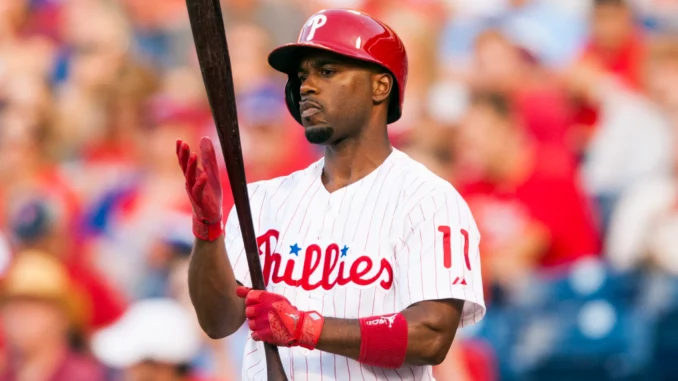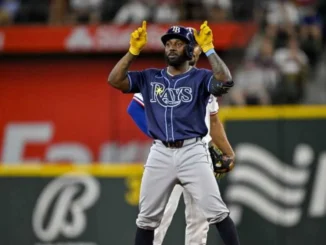
Jimmy Rollins, the iconic shortstop who spent the majority of his illustrious career with the Philadelphia Phillies, recently opened up about a lingering regret—the contract he signed with the Phillies in 2011. Rollins, known for his electrifying playstyle and unwavering loyalty to the Phillies organization, revealed in a candid interview that he wishes he had approached his contract negotiations differently. As Phillies fans reminisce about Rollins’ glory days, his reflections offer a rare glimpse into the inner workings of professional sports contracts and the complexities that athletes navigate.
In 2011, Rollins, then a cornerstone of the Phillies’ lineup and a perennial All-Star, entered free agency after completing his previous contract. The Phillies, keen on retaining their star shortstop, engaged in negotiations with Rollins, ultimately striking a deal that would keep him in Philadelphia for three more years, with a vesting option for a fourth. The contract was valued at $33 million, a significant investment for the franchise.
At the time, Rollins’ decision seemed logical. He had spent his entire career with the Phillies, winning a World Series championship in 2008 and earning numerous accolades, including the National League MVP award in 2007. Rollins was a beloved figure in Philadelphia, revered for his leadership both on and off the field. However, as the years passed, Rollins began to feel the weight of his contract and its implications on his career trajectory.
In hindsight, Rollins expressed regret over the financial terms of the contract, believing that he could have garnered a more lucrative deal on the open market. Despite his achievements and contributions to the Phillies’ success, Rollins felt undervalued in the negotiations, a sentiment that lingered throughout the duration of the contract.
Moreover, Rollins admitted that the contract extension may have limited his options in the later stages of his career. As he entered his mid-thirties, Rollins found himself grappling with declining performance and the realities of aging in professional sports. While he remained committed to the Phillies and endeavored to contribute to the team’s success, Rollins couldn’t shake the feeling that his contract had tied him to a situation that was increasingly difficult to navigate.
Rollins’ reflections underscore the complexities of athlete-team dynamics in the realm of professional sports. While contracts are often seen as a measure of a player’s worth, they also carry long-term implications that extend beyond the field of play. For Rollins, the contract with the Phillies represented more than just financial security—it was a testament to his loyalty to the organization and his desire to remain a fixture in Philadelphia sports lore.
Despite his regrets, Rollins remains grateful for his time with the Phillies and the memories he created with teammates and fans alike. His journey serves as a reminder that success in sports is not solely defined by statistics or contract figures but by the intangible bonds forged between players, teams, and communities.
As Rollins continues his post-playing career, his reflections on the contract with the Phillies offer valuable insights for aspiring athletes and sports enthusiasts alike. In the ever-evolving landscape of professional sports, Rollins’ story serves as a poignant reminder of the delicate balance between loyalty and self-advocacy in the pursuit of excellence.



Be the first to comment